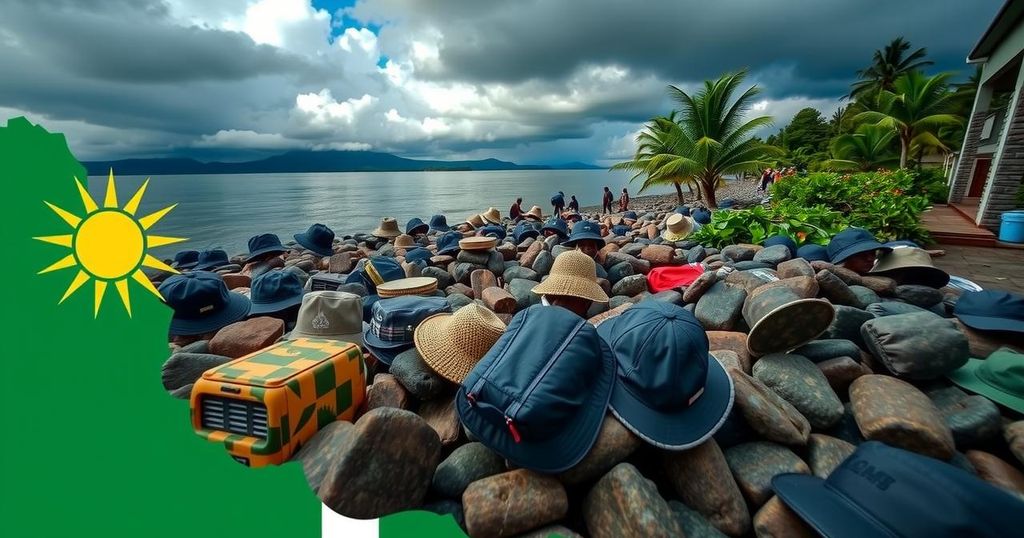Commonwealth Leaders Converge in Samoa for Climate and Reparations Dialogue

The Commonwealth Summit in Samoa focuses on climate change and reparations for Britain’s role in transatlantic slavery. Leaders from 56 nations gathered, with particular concern for low-lying islands at risk from climate impacts. Discussions include adherence to Paris Accord goals and the urgent call for dialogue on reparations, reflecting a balance between addressing past injustices and future challenges.
On Thursday, leaders of the Commonwealth nations convened in Samoa to discuss pressing global issues, primarily focusing on climate change and the question of reparations for Britain’s involvement in transatlantic slavery. The Commonwealth Heads of Government Meeting (CHOGM) began on Monday, featuring King Charles as a representative for 56 countries, many of which have historical ties to Britain’s former empire. The summit is particularly significant for its representation of small nations, many being low-lying islands vulnerable to climate change and rising sea levels. Tuvalu’s climate change minister, Maina Vakafua Talia, highlighted this vulnerability, urging Commonwealth leaders to adhere to the Paris Accord’s target of limiting global warming to 1.5 degrees Celsius. He stressed that new fossil fuel projects threaten the very existence of island nations, labeling them a “death sentence.” Climate change was emphasized as a paramount issue; Australian Foreign Minister Penny Wong declared it the foremost national security and economic threat in the Pacific region. Concurrently, Zambia’s representatives called attention to the alarming impact of climate change on food security, amplifying the concerns shared among member states. As part of the proceedings, King Charles is expected to observe firsthand the challenges posed by rising sea levels, which a Samoan chief described as forcing populations to migrate inland. The United Nations Secretary-General, Antonio Guterres, reported that ocean temperatures in the Pacific Islands are rising at three times the global average, leaving their inhabitants uniquely vulnerable. During the summit’s agenda, discussions regarding reparations for slavery are also anticipated. This has been a growing demand, particularly from the Caribbean Community (CARICOM) and the African Union. British Prime Minister Keir Starmer stated on Monday that the issue of reparations would not be formally addressed at the summit and that he preferred to focus on future engagements rather than past transgressions. However, CARICOM officials view the summit as an important opportunity for discussions on reparations, emphasizing the need for dialogue on this critical issue. Individuals like Eric Phillips from CARICOM’s reparations commission and Kingsley Abbott from the Institute of Commonwealth Studies indicate ongoing behind-the-scenes discussions regarding the potential for reparative measures. In contrast, some opposition voices argue against holding contemporary nations accountable for historical injustices, while advocates for reparations highlight the persistent racial inequalities stemming from slavery’s legacy. The historical context of these discussions is imperative, as millions of Africans were forcibly taken as slaves between the 15th and 19th centuries, enduring brutal conditions and largely contributing to the economic prosperity of colonial nations, particularly in the Americas. In summary, CHOGM in Samoa serves as a pivotal platform for raising awareness about the existential threats posed by climate change while simultaneously addressing the long-overdue conversation regarding reparations for historical injustices tied to slavery. The outcomes of these discussions may shape future policy and international relations within the Commonwealth community and beyond.
The Commonwealth of Nations, largely comprised of territories that were once part of the British Empire, gathers to address contemporary global issues pertinent to its diverse member states. The current summit in Samoa focuses on two significant topics: the climate crisis, which disproportionately affects its smaller island nations, and the contentious issue of reparations for the transatlantic slave trade long historically absent from formal dialogue among member nations. As many Commonwealth countries are still grappling with the socio-economic repercussions of colonialism, including systemic inequalities linked to slavery, the calls for reparations have intensified amid growing global awareness. The prominence of climate change discussions is equally pressing, given the urgency of the climate crisis facing numerous island nations threatened by rising sea levels and extreme weather patterns.
The gathered leaders at the Commonwealth Summit in Samoa are addressing two interconnected crises that represent moral and existential challenges facing their nations: climate change and historical injustices stemming from slavery. While commitments to limit global warming and protect vulnerable populations persist at the forefront of discussions, the topic of reparations for slavery also continues to gain momentum. This summit not only highlights the urgent need for collaborative action in combating climate change but also the necessity for reconciling with historical wrongs to foster a more equitable future among the Commonwealth nations.
Original Source: stratnewsglobal.com






